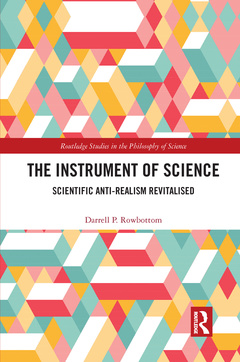The Instrument of Science Scientific Anti-Realism Revitalised Routledge Studies in the Philosophy of Science Series
Auteur : Rowbottom Darrell P.

Roughly, instrumentalism is the view that science is primarily, and should primarily be, an instrument for furthering our practical ends. It has fallen out of favour because historically influential variants of the view, such as logical positivism, suffered from serious defects.
In this book, however, Darrell P. Rowbottom develops a new form of instrumentalism, which is more sophisticated and resilient than its predecessors. This position??cognitive instrumentalism??involves three core theses. First, science makes theoretical progress primarily when it furnishes us with more predictive power or understanding concerning observable things. Second, scientific discourse concerning unobservable things should only be taken literally in so far as it involves observable properties or analogies with observable things. Third, scientific claims about unobservable things are probably neither approximately true nor liable to change in such a way as to increase in truthlikeness.
There are examples from science throughout the book, and Rowbottom demonstrates at length how cognitive instrumentalism fits with the development of late nineteenth- and early twentieth-century chemistry and physics, and especially atomic theory. Drawing upon this history, Rowbottom also argues that there is a kind of understanding, empirical understanding, which we can achieve without having true, or even approximately true, representations of unobservable things. In closing the book, he sets forth his view on how the distinction between the observable and unobservable may be drawn, and compares cognitive instrumentalism with key contemporary alternatives such as structural realism, constructive empiricism, and semirealism.
Overall, this book offers a strong defence of instrumentalism that will be of interest to scholars and students working on the debate about realism in philosophy of science.
Science as an Instrument: An Introduction
1. Scientific Progress and the Value of Science
2. The Limits of Scientific Discourse about the Unobservable
3. Unconceived Alternatives and the Contingency of Science’s Content
4. Historical Illuminations: 1885–1930
5. Empirical Understanding
6. Objections and Comparisons
7. The Illusion of Scientific Realism
Appendix: What Is Scientific Realism?
Darrell P. Rowbottom is Professor of Philosophy at Lingnan University, and serves as Editor in Chief of Studies in History and Philosophy of Science Part A.He is the author of Popper’s Critical Rationalism: A Philosophical Investigation (Routledge, 2011) and Probability (2015). He also co-edited Intuitions (2014) with Anthony R. Booth. He has published numerous articles in leading journals, including Analysis, Australasian Journal of Philosophy, British Journal for the Philosophy of Science, Philosophy and Phenomenological Research, Philosophy of Science, Synthese, and Studies in History and Philosophy of Science (Parts A and C).
Date de parution : 06-2021
15.2x22.9 cm
Date de parution : 04-2019
15.2x22.9 cm
Thèmes de The Instrument of Science :
Mots-clés :
Moon’s Apparent Motion; Orbital Angular Momentum; Darrell Rowbottom; Cognitive Instrumentalism; scientific realism; Ontic Structural Realism; scientific anti-realism; Moisture Content; instrumentalism; Beta Rays; structural realism; Vice Versa; constructive empiricism; Unobservable Things; semirealism; Unconceived Alternatives; philosophy of science; Angular Momentum; Gravitational Field Strength; scientific value; Intrinsic Angular Momentum; understanding; scientific methods; Fourth Quantum Number; history of science; De Regt; atomic theory; Real Pendulum; Unconceived Experiments; Simple Pendulum; Croquet Balls; Van Fraassen; Nasir Al Din Al Tusi; Mental Satisfaction; Auxiliary Properties; Detection Properties; Property Instrumentalism



